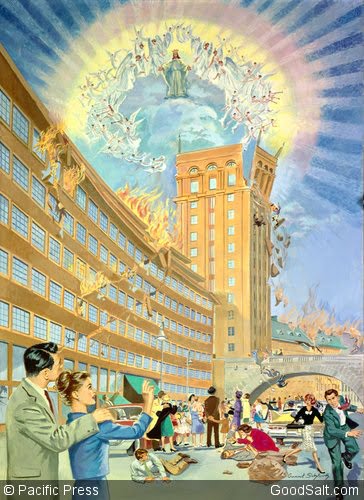Wednesday: Judgment Hope
Read Ecclesiastes 8:14. In what ways do you see the stark and powerful reality of what is written here?
While suffering, oppression, and tragedy are hard enough to bear in their own right, the injury or insult is harder still if it appears to be meaningless or unnoticed. The possible meaninglessness of sorrow is heavier than its initial burden.
A world without record or final justice is the ultimate in cruel absurdity. No wonder atheist writers in the twentieth century lamented about what they believed was the “absurdity” of the human condition. With no hope of justice, no hope of judgment, no hope of things being made right, ours would indeed be an absurd world.
But the cry of Ecclesiastes 8:14 is not the end of the story. At the end of his protests, Solomon takes a sudden turn. In the midst of his laments about meaninglessness, he says, essentially: Hold on a minute, God is going to judge, so everything is not meaningless; in fact, now everything and everyone matters.
Read Ecclesiastes 12:13-14. What does this tell us about just how important all that we do here is?
The hope of judgment comes down to what one believes about the core nature of God, life, and the world in which we live. As we have seen, the Bible insists that we live in a world that God created and loves, but a world that has gone wrong and in which God is working toward His plan for re-creation, all through the life and death of Jesus. God’s judgment is a key part of His setting our world right. For those on the receiving end of so many of the world’s wrongs—those who have been marginalized, brutalized, oppressed, and exploited—the promise of judgment is surely good news.
|
What does it mean to you to know that, one day, and in ways we can’t imagine, the justice that we so much long for now will finally come? How can we draw hope from this promise? |


I have mentioned several times recently the C S Lewis idea that the Jewish view of judgement as a civil court rather than a criminal court. The idea that the judgement is about putting a wrong right, rather than punishment for wrong doing. That there is a final judgement is a comforting thought but it should not lead us to complacency on the issues of justice and mercy now.
One of the most popular phrases in the last 100 years is:
It is attributed to a number of famous people but to the best of my understanding most of these people have only quoted from other people who have said the same thing.
If our hope in the judgement because that is where God will sort it all out, leads us to do nothing now, then we are guilty of the greatest hypocrisy of all. We may not be able to solve all the big issues of justice and mercy, but God has given each of us our own sphere of influence now and that is where we are commanded to:
In that respect we bring the judgement – putting wrongs right – into the “now” of our experience.
Who am I?
I am a sinner
I am slave to sin
Left on my own, no power to save myself.
Born with a death sentence.
Without life.
Who am I In Christ?
Chosen race
Royal priesthood
I am a child of God
New creation
Citizen of Heaven
Life eternal
The judgment is given to each based on the above question.
What is your choice?
HOW DO THEY JUDGE US?
If you visit the poor and give them some food and clothes, do you have to take their pictures and post them on social media?
If you post yourself doing these good works, is the glory going to you or to Christ ? I think if you are doing it for Christ you should leave your camera at home.
A gospel campaign was done for two weeks in a poor neighbourhood but the church did not get any new converts . A survey was done to know why the poor people did not join the church. The answer was simple, the church presented itself as being very rich. The poor people felt poorly dressed among the church members.
When you visit the least of these , what you wear and carry matters alot. My wife Peris is afraid of cockroaches and I always wonder what her reaction would be if we visit the poor and find cockroaches in the house.
…..sometimes when we visit the needy we have to act as if everything is ok… although it is not really ok. We have to bear with them.
Taken from next weeks lesson. “To love mercy”. Not only to love mercy, but also to do justice, and walk humbly with our Lord. Micah 6:8. He has shown us His desire, this is what He wants us to do, might I say required of us.